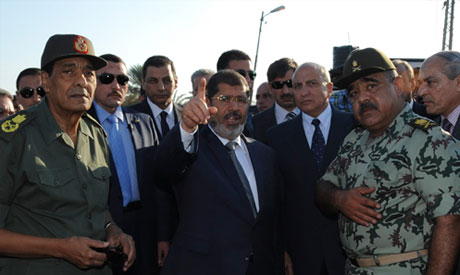 President Mohamed Morsi has announced an official state of mourning over the killing of Egyptian border guards in the midst of an attempted militant attack on Israeli targets on Sunday evening near the Gaza-Rafah border.
President Mohamed Morsi has announced an official state of mourning over the killing of Egyptian border guards in the midst of an attempted militant attack on Israeli targets on Sunday evening near the Gaza-Rafah border.
Morsi had told state television on Sunday evening soon after the attack that "the criminal act will not go unpunished".
However, the president has neither identified the suspected culprits nor indicated the nature of ramifications that this attack will bring about.
"Egypt definitely cannot blame Israel for the killing of Egyptian soldiers on the borders because we know, and Egypt knows, that Israel has been sending warnings in writing of a potential security breakdown in Sinai for the past few days," said a Cairo-based Western diplomat.
Egyptian security, military and diplomatic sources confirm that Israel has sent repeated warnings during the past few days over a possible attempted attack on Israeli targets.
Israel and the US have also called on their citizens to avoid Sinai during the past few days.
"Clearly we too detected that something was happening and actually when the attempted attack started we alerted the Israelis and tried to work with them to contain it, but things got out of hand," said an Egyptian official.
The Sunday attack came at a time when Israel was complaining to the international community, especially to the US, about the "deteriorating security arrangements in Sinai" following the fall of the regime of ousted president Hosni Mubarak in February 2011.
A few weeks ago, Israel officially sent a letter to the UN Security Council to complain about the situation in Sinai, in an unprecedented move on the side of Tel Aviv since the signing of the Egyptian-Israeli Peace Treaty in 1979.
Senior Israeli officials have been complaining that Egypt has not made any serious use of the Israeli approval for Egypt to upgrade its security presence in Sinai beyond the limitations of the regulations stipulated in the peace treaty, in order to facilitate Cairo's mission to contain the security problems in Sinai.
Today, sources at the Presidential Palace say that Morsi has received a round of calls that were mainly expressing deep concern over the situation in Sinai and its implications for Israeli border security.
Some of the calls, one source said, indicated that Israeli "constraint" in the face of any future attack executed from Sinai might not be guaranteed.
According to various security and official sources, in his meetings with top security, intelligence and military aides this morning, Morsi had to succumb to their suggestions of imposing a tight security grip on the borders with Gaza.
Morsi reluctantly agreed to shut down the Rafah crossing point – the only non-Israeli controlled border for the otherwise enclosed and besieged Gaza.
The president had recently promised Hamas leaders, effectively in control of Gaza since 2007 away from the clout of the Ramallah-based Palestinian Authority, to reduce the tough security measures on the borders between Gaza and the Egyptian territories. Today, these and other relevant promises would have to be at least suspended.
"Of course this is not what Morsi as an Islamist president was hoping for; he was clearly hoping to make things easier for Palestinians in Gaza and to build bridges with Hamas, but we have a crisis to attend to," said a security source.
During the past month, the first for Morsi in office, the president had received both Khaled Meshaal, the exiled Hamas leader, and Ismail Hanniyah, the PA-dismissed Hamas prime minister in Gaza.
During his meetings with both Meshaal and Hamas, Morsi had promised to introduce an incremental set of procedures to ease the hardship sustained by over 1.5 million civilians in Gaza who had been living under the Israeli-imposed siege for the past five years at a very high humanitarian cost.



